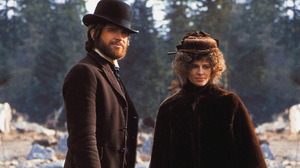McCabe and Mrs. Miller

Born in Kansas City in 1925, Robert Altman grew up in the heartland of America yet always seemed to peer toward its edges. After serving as a bomber pilot in World War II, he found his way into industrial filmmaking and episodic television, quietly crafting documentaries and scripted stories behind the scenes. That anonymity dissolved in 1970 with M*A*S*H, a chaotic anti-war satire that brought him sudden critical and commercial acclaim. Unlike his contemporaries, Altman favored atmosphere over action, using overlapping sound and visual fragmentation to reveal meaning in decay, a style that captivated audiences even as it unsettled studio executives.
Within a year of that breakout success, Altman launched his own production company and embarked on an unconventional Western. Adapted from a little-known novel by Edmund Naughton, McCabe and Mrs. Millerwould dismantle the genre’s familiar trappings – gunfighters, brothels, frontier ambition – and reassemble them in a haze of mist and melancholy. Filmed in the snow-covered woods of British Columbia during the winter of 1970, the production yielded one of the purest expressions of Altman’s artistry: elusive, unhurried, and profoundly alive.
In McCabe and Mrs. Miller, Altman reframed the American West as a snow-draped elegy, its mythology drained of heroism and steeped in ambiguity. His loose, observational structure – marked by glancing dialogue and languid rhythms – reveals a filmmaker drawn less to narrative propulsion than to the slow accumulation of mood and texture. Yet beneath that surface lies extraordinary clarity: about human ambition, the mechanics of power, and the quiet dissonance between personal longing and collective disregard. Fifty years on, the film endures as more than a revisionist Western. It is a romantic epic rendered in slush and smoke, where lives drift toward ruin with exquisite grace – a hauntingly cinematic vision of disenchantment.
The story begins beneath a dark, overcast sky, as John McCabe arrives in the remote town of Presbyterian Church, cloaked in a massive bearskin coat and surrounded by murmurs of a violent past. Whether he is a gunfighter or merely a gambler remains unclear, yet he wastes no time establishing himself, erecting a saloon and brothel on the muddy frontier. His authority rests not on firepower but on presence, carrying an air of confidence that others mistake for certainty. The town, barely more than a skeletal outpost sinking into its own terrain, welcomes his enterprise as a sign of civilization and progress.
Into this precarious world comes Constance Miller, a seasoned madam from San Francisco whose arrival quietly reshapes the town’s future. She immediately recognizes the shortcomings of McCabe’s crude setup and proposes a mutually beneficial business arrangement: in exchange for a share of the profits as his partner, she will manage the brothel with order and discretion. McCabe, charmed and unsettled by her cool pragmatism, reluctantly agrees. Their relationship unfolds in silence and restraint, complicated by unacknowledged affection and mutual wariness. McCabe harbors a romantic vision of their bond, while Constance, shaped by hardship and dulled by opium, maintains a clear-eyed distance.
Under their joint leadership, the town begins to prosper, its muddy outskirts giving way to something resembling permanence. Prosperity, however, attracts unwanted attention. Representatives from the powerful Harrison-Shaughnessy Mining Company soon arrive with an offer to buy McCabe out. Emboldened by his own myth, he declines, imagining himself a shrewd negotiator. The company responds by sending three hired gunmen: a cold-eyed youth, a brutal enforcer, and an aging professional. Gradually recognizing the scale of his mistake, McCabe attempts to reverse course, offering to sell under their original terms, but his pleas are ignored. These men have not come to bargain, they have come to bury.
In the film’s haunting final sequence, a relentless snowstorm descends on the town. As a fire breaks out at the church and the townspeople rush to contain it, McCabe is left alone to confront his fate. Unskilled with a gun and growing desperate, he survives through instinct and deception, killing his assailants in a series of clumsy, improvised encounters. Wounded and exhausted, he collapses into the snow, his death unnoticed by the community whose fortunes he helped build. Across town, Constance lies insensate in an opium den, slipping deeper into a narcotic haze, unaware of McCabe’s final, futile stand.
At its core, McCabe and Mrs. Miller is a requiem – for romance, for capitalism, for the sustaining of myth itself. It strips the Western genre of its moral binaries and replaces them with the indifference of weather, commerce, and the grinding machinery of power. McCabe’s tragedy stems from his belief that charisma can withstand capital. Constance, less sentimental, sees through the illusion. Together, they form a portrait of misaligned hopes, their intimacy heavy with unspoken sorrow. Altman finds aching beauty in this dissonance, rendered with quiet lyricism: in snowflakes, in silence, and in the subtle ways people fail one another, almost gently.
Altman’s commitment to texture extended to every element of production. He insisted on building the town from the ground up and filming in sequence so that the weathered, physical setting mirrored the emotional wear of the characters. Cinematographer Vilmos Zsigmond’s flashing of the film negative lends the images their distinctive gauzy, dreamlike softness, while Leonard Cohen’s acoustic songs, recorded years earlier, add a further layer of mournful detachment. Studio executives were baffled by the final cut, and early screenings fell flat.
Although McCabe and Mrs. Miller met with a muted response upon its 1971 release, its reputation has steadily grown. Today, it is widely regarded as a landmark of American cinema, its influence echoed in the elegiac naturalism of Days of Heaven, the moral rot of Deadwood, and the existential fatalism of There Will Be Blood. A Western more concerned with erosion than conquest, McCabe and Mrs. Miller endures as one of the most poetic visions ever captured of America – its illusions, appetites, and loneliness. Through its fogged lens and drifting rhythms, Altman conjured a film that lingers like a memory half-faded, a masterpiece that continues to speak softly, unresolved, through the snowfall.
